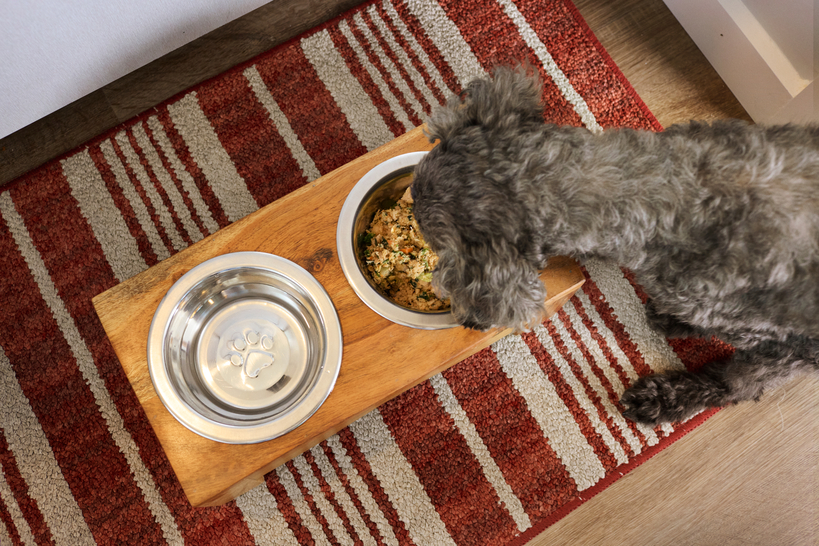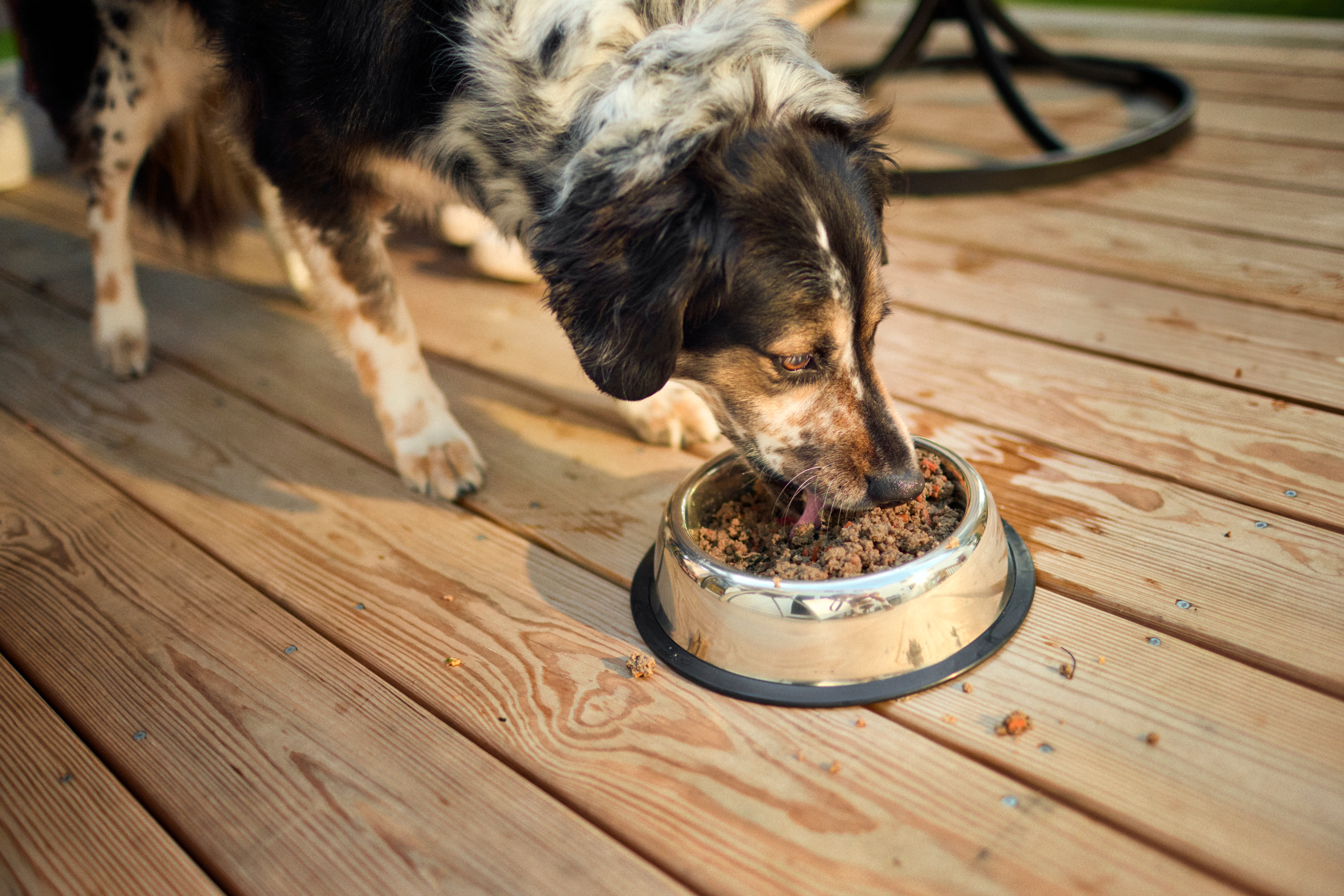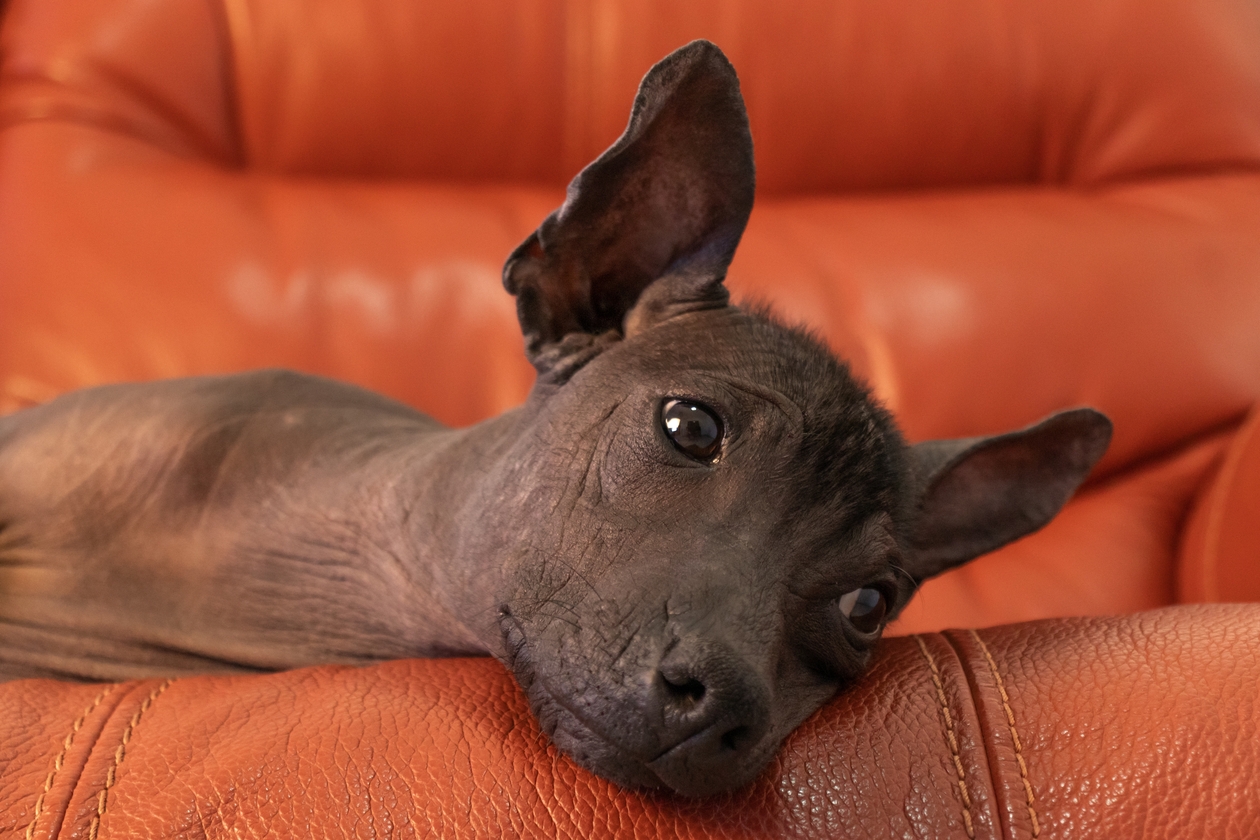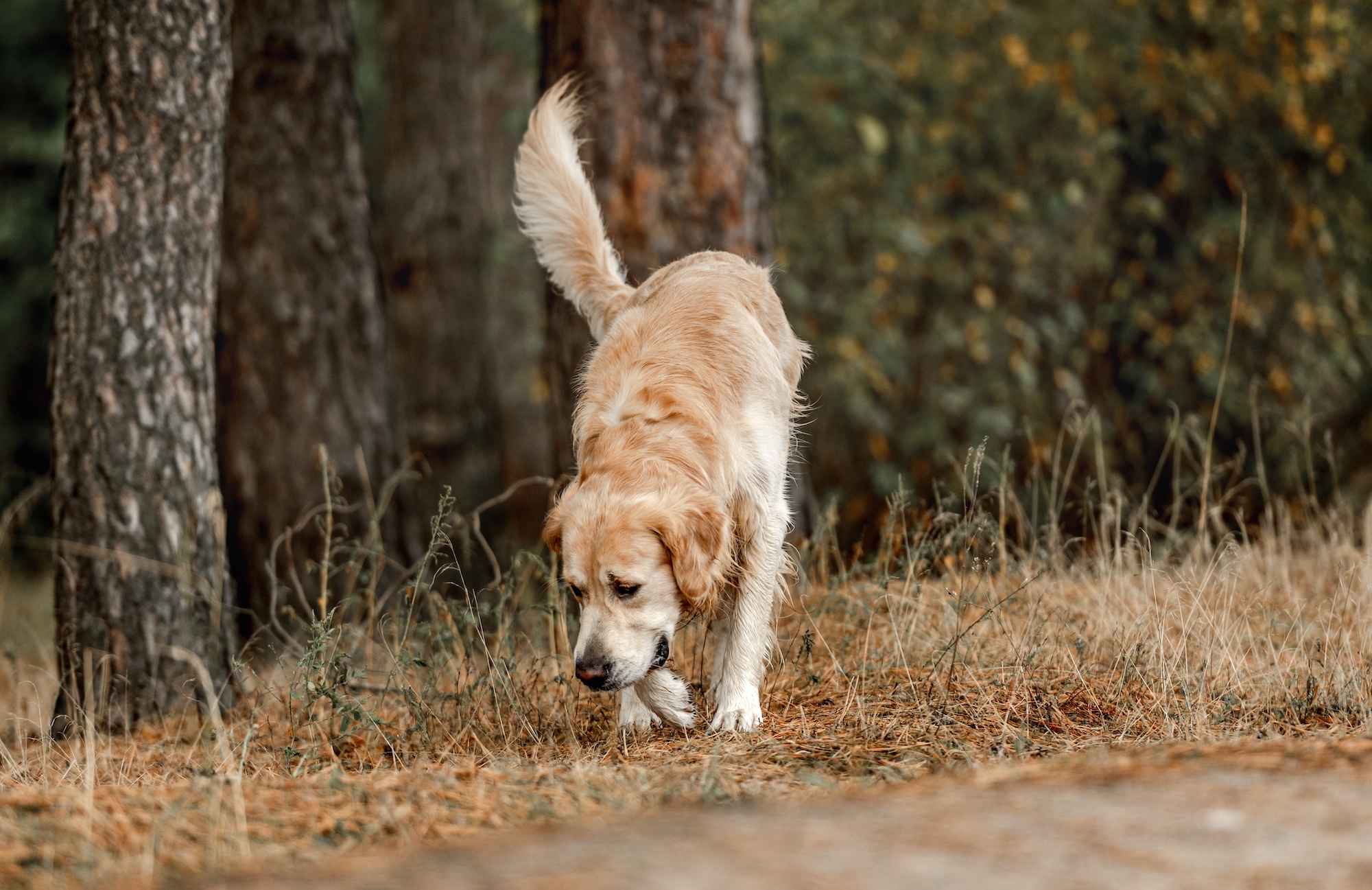
In this article:
- Why do dogs eat poop?
- How common is it for dogs to eat poop?
- Is eating poop dangerous for my dog?
- How can I stop my dog from eating poop?
If your dog eats poop, you may find yourself disgusted, confused, exasperated, and unsure of how to convey that excrement isn’t part of a complete and balanced diet.
Grotesque to humans, poop-eating—which scientists call coprophagia—is actually fairly common in dogs. Still, it can carry health risks, and there’s a good chance you want your dog to stop regardless. Here’s why researchers say dogs eat poop, and how you can discourage the habit.
Why do dogs eat poop?
Dogs may engage in three types of coprophagia: eating another dog’s poop (allocoprophagia), eating another species’ poop, and eating their own (autocoprophagia).
Their motivation may arise from a combination of internal and external forces. “It’s somewhat genetic [and] somewhat learned,” said Nicholas Dodman, BVMS, DVA, DACVAA, DACVA, DACVB, professor emeritus of behavioral medicine at Tufts University and CEO, president, and co-founder of the Center for Canine Behavior Studies.
Mothers may eat poop because of instinct
It may come as a surprise to learn that eating another dog’s waste is an instinctive behavior in nursing dogs—it helps them keep a sanitary environment for their pups. The mother “will lick the puppies’ backsides to make them defecate,” Dr. Dodman said. “And then she eats the poop.”
With this in mind, you might expect to see the behavior more often in female dogs than male dogs. The habit is “somewhat more common in females,” according to Katherine Houpt, VMD, Ph.D., a professor emeritus of behavioral medicine at the Cornell University College of Veterinary Medicine. Still, males are susceptible to consuming number twos, too.
Puppies may eat poop because they’re curious
Puppies, meanwhile, may sample excrement out of sheer novelty. Indeed, they’re known for trying to eat or chew on everything in sight. And “puppies of coprophagic dogs tend to be coprophagic,” Dr. Houpt said. In plain terms: Dogs whose parents eat poop are more likely to eat poop themselves. However, we’re not sure if that behavior develops from observation or an intrinsic tendency.
Dogs may eat poop because they associate smells of waste with food
Dogs whose food and bathroom spot are in the same area may also develop an association between the two smells, figuring that both are for eating.
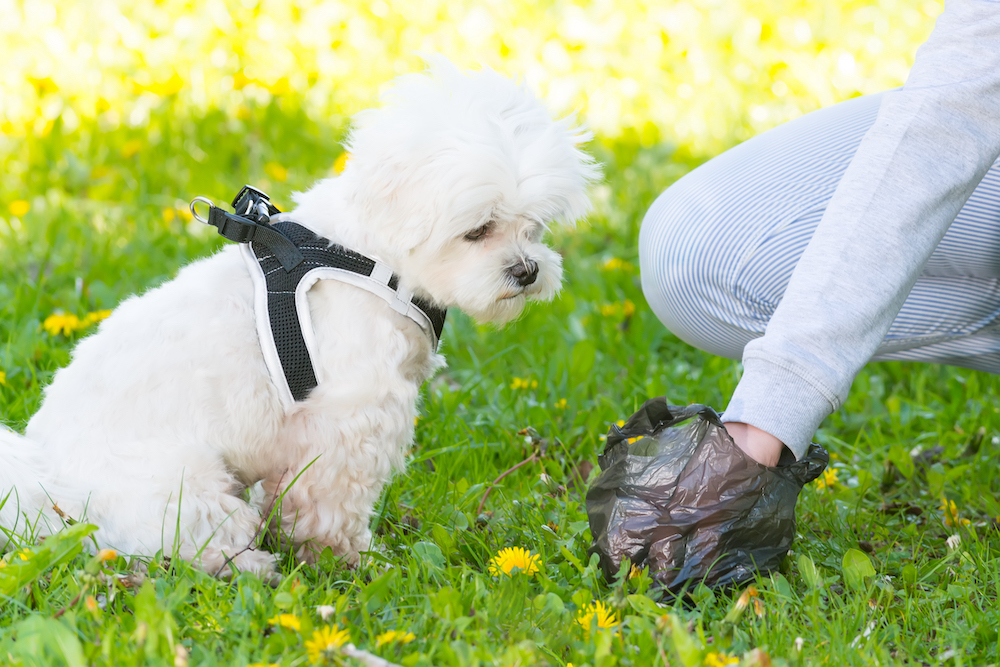
Dogs on their own may eat poop to survive
The innate urge to devour fecal matter may also have evolved as a survival mechanism. “In the middle of the winter, if [dogs] can’t catch any prey, [eating poop] might be one way to survive,” Dr. Houpt said. Dung, which could come from another dog or a separate species entirely, may contain some undigested protein or fat, which a dog can sniff out with their ultrapowered nose. Droppings from herbivores, like deer and horses, may be especially appealing for the nutrients they can provide.
“I had a resident whose dog had once eaten a whole bushel of manure,” Dr. Houpt said.
That said, pet dogs whose humans meet their nutritional needs with a complete and balanced diet formulated by board-certified nutritionists have no need to forage for protein.
The authors of the 2018 study also hypothesized that dogs may have inherited this behavior from ancestral wolves who ate poop to keep the den free of intestinal parasites that could develop into infectious larvae if left to fester.
Dogs may eat poop because they’re bored
Feasting on fecal matter could also be a sign that something else is wrong. Dogs might do it as attention-seeking behavior, because of a lack of enrichment or stimulation, or out of stress in what’s known as displacement behavior, according to Lisa Radosta, DVM, Diplomate of the American College of Veterinary Behaviorists, a Board-Certified Veterinary Behaviorist and owner of the Florida Veterinary Behavior Service. Poop-eating could even have “roots in a compulsive disorder,” Dr. Dodman said, though a 2018 study published in the journal Veterinary Medicine and Science didn’t find an obvious association between this habit and compulsive-like behaviors.
Dogs may eat poop because of a medical condition
This unsavory practice may also come from a medical condition. If a dog who has never eaten poop before suddenly starts to do so, that merits a vet appointment, Dr. Houpt said. For example, exocrine pancreatic insufficiency, a disorder where the pancreas doesn’t produce sufficient amounts of enzymes, can result in poor digestion and absorption of nutrients; afflicted dogs may gobble feces in an effort to extract enzymes.
Cushing’s disease and diabetes mellitus can also cause an increase in appetite, which may lead dogs to eat excrement, Dr. Dodman said.
Dogs may eat poop… because they think it’s tasty
But perhaps the most unsettling possibility is that feces might seem yummy to a healthy dog. The poop, which is right there, may actually whet their appetite. Some dog owners, Dr. Dodman said, may have even watched in horror as their beloved pooch contorted themselves into a U-shape to eat their own waste fresh, as it emerged. Some dogs may eat poop not just because they find it tasty, but because they’re actually hungry—again, pet dogs typically have a regular source of nutrient-dense food, so Dr. Radosta said this underlying reason isn’t common among them.
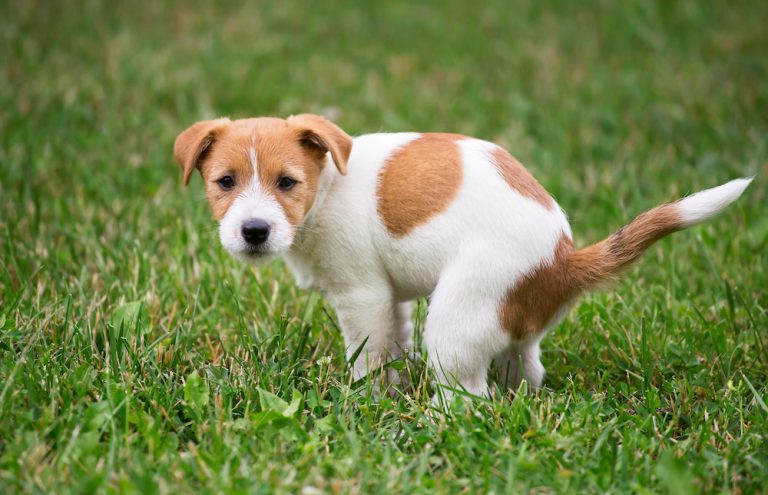
How common is it for dogs to eat poop?
Research has sought to quantify just how often dogs engage in this activity. In the 2018 study, a team analyzed data collected through two online surveys on over 3,000 dogs. They found that 16% of these dogs engaged in “frequent” coprophagia, defined as having been observed eating stools at least six times. The findings also revealed that these dogs generally preferred fresh feces, no more than two days old.
Another study published in 2019 in the Journal of Veterinary Behavior, on which Dr. Dodman is a senior author, found that of 4,100 dogs described in survey responses, 18% displayed coprophagia. If you say hi to as many dogs as we do, you may be coming across poop-eating pooches every day.
Is eating poop dangerous to my dog?
It’s gross for a dog to eat their own stool, but the good news is it isn’t dangerous as long as they’re healthy. “It’s disgusting to us, and it gives the dog bad breath, but there’s no medical problem with poop-eating,” Dr. Dodman said.
Eating anyone else’s poop, though, is dangerous for dogs.
“The biggest risk is going to be infestation with intestinal parasites,” Dr. Radosta said. For example, dogs can consume roundworms or hookworms in feces, which could make them ill. Droppings may also include other harmful bacteria like E. coli, and viruses like canine parvovirus that cause gastrointestinal diseases.
How do I stop my dog from eating poop?
To start, remove opportunities—your dog can’t eat poop if there’s no poop to eat. Keep your yard poop-free, clean your dog’s crate if they have an accident, and pick up after your dogs the moment they’re finished pooping on walks. You may want to stop letting your dog roam the backyard freely if they might come across a tempting piece of feces or try to pick up after themselves after they eliminate. Again, keeping them from eating another animal’s poop is crucial to prevent dangerous parasiting infections. You could also address this issue by using a basket muzzle, but then you might find yourself having to clean a poo-crusted mask multiple times a day.
Otherwise, the approach to addressing this behavior depends on the cause. Consult your veterinarian or a veterinary behaviorist to get to the bottom of it, ruling out possible illnesses. Your vet may want to run a battery of tests for various conditions, which all have their own course of treatment. Dr. Dodman said that, if there is a compulsive disorder driving this behavior, anticompulsive medications would be a “last resort” after behavioral approaches.
If your dog eats poop out of stress, anxiety, or boredom, give them more physical and mental stimulation. Use puzzle mats, take them on longer or more frequent walks, or teach them a new skill. If your puppy is wolfing down excrement, it’s possible they may outgrow the behavior—but you should continue to guide them toward better choices.
Classical conditioning can also break this filthy habit. Dr. Houpt recommended teaching a poop command. “You can say ‘number two’ or ‘poop’ or whatever word you want to use,” she said. Then, as soon as your dog eliminates, reward them with a treat to distract them from their own waste and reinforce a positive association between the new command and the act of going to the bathroom. This is also a good time to teach or implement “drop it” or “leave it” skills. Consider working with a certified trainer for extra support. But, if your dog’s poop-eating is due to a medical problem, training tactics won’t work.
While there are a number of so-called remedies marketed as coprophagia deterrants, Dr. Houpt, Dr. Dodman, and Dr. Radosta poo-pooed them as ineffective. Indeed, the 2018 study reported that 11 commercial products’ reported success rate among survey respondents was close to zero.
Above all, it’s crucial to not punish your dog for eating poop. “Punishment just suppresses behavior,” Dr. Houpt said. “It doesn’t change the dog’s motivation.” This tactic may only make the dog aggressive or fearful toward you, harming your bond.
Living with a coprophagic canine may be nauseating and even mortifying—but remember that this behavior is actually somewhat common. Many dog owners before you have handled it. This, too, shall pass.
